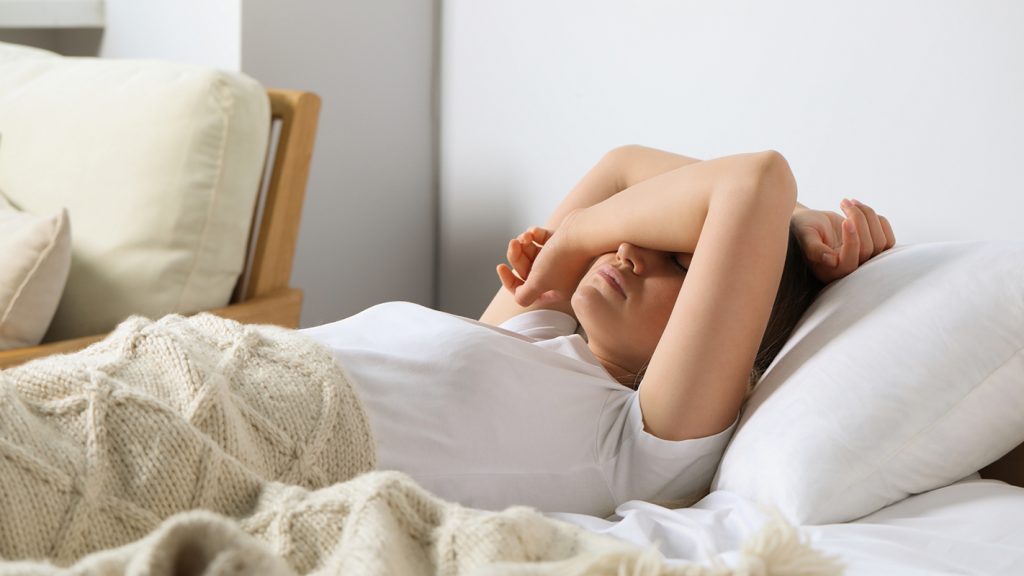Written by: Dr. Michael Mandrusiak, PsyD, Registered Psychologist
An Insomnia Story
Demi is a fast-paced professional who juggles work and family and still manages to stay on top of her game. A recent and exciting career change is nothing unusual for her, but three weeks into the new gig she experiences three nights of difficulty falling and staying asleep.
She is very motivated to make a good impression in her new role and does not want her work performance to suffer. The next few nights, she sleeps for roughly four hours each night, about half of her usual sleep time.
Demi feels anxious each night as bedtime approaches, worrying that she will not fall asleep. What if she has another rough night? What if she is exhausted and cannot manage things at work the next day?
What scares Demi the most is the thought that her sleep difficulties will never go away. Sure enough, her sleep difficulties linger over the next several weeks, seemingly confirming this fear.
The Secret to Beating Insomnia
If this scenario sounds familiar to you, you may be among the quarter of Canadian adults who report dissatisfaction with their sleep.1 That number represents a 42% increase in the number of Canadian adults who reported sleep difficulties between 2002 and 20151.
Often, these difficulties are triggered by a stressful event that temporarily disrupts sleep. Insomnia can also begin as part of normal changes to sleep patterns due to ageing but can worsen because of factors outside your awareness.
The good news is that there is an effective strategy available to improve the length and quality of sleep called Cognitive Behavioural Therapy for Insomnia.
Researcher and author Dr. Gregg Jacobs literally wrote the book on insomnia – it’s called Say Good Night to Insomnia2 and it describes a medication-free cognitive behavioral treatment plan that he claims helps 100% of people who follow it to improve their sleep.
Jacobs argues (and he has plenty of research to back it up), the two critical factors that turns temporary sleep difficulties into chronic insomnia are problematic beliefs (thoughts and attitudes) and behaviors (habits) that interfere with sleep.
According to Jacobs and his research, understanding and changing these thoughts and behaviors are the most effective ways to treat insomnia.
Examples of Things You Do That Unintentionally Make Insomnia Worse2
Here are a few thoughts and behaviors that may inadvertently contribute to sleep difficulties:
- Going to bed early to try to catch up on sleep
- Focusing too much on trying to fall asleep
- Worrying about the consequences of not falling asleep (I won’t be able to function!)
- Staying in bed for long periods of time when you can’t fall asleep
- Spending time engaging in high-stimulus activities (for example, looking at your phone or viewing media) in the hours immediately before bed
- Consuming caffeine in the afternoon or evening
- Drinking liquid before bedtime so that you need to go to the bathroom in the middle of the night
Examples of Things You Can Do to Help Beat Insomnia2
Here are a few strategies and recommendations to help improve sleep quality:
- Keeping a sleep record for a few weeks to help identify patterns impacting sleep quality (examples of such charts can be found on his book or online).
- Doing something calming for 30 minutes to an hour immediately before bed, such as reading a book (but maybe not a page-turner thriller).
- Staying out of bed for most activities other than sleep (and sex) to help build an association between sleep and being in bed.
- Getting out of bed and engaging in a low-stimulus, low light activity such as reading if you cannot fall asleep after 45 minutes to an hour. Returning to bed when feeling sleepy.
- Keeping your room cool (not as easy in the summer!).
- Taking the pressure off – stop worrying about whether you will fall asleep.
- Reminding yourself you will be able to function the next day, even if you don’t get a great night’s sleep. That’s because you usually get more sleep than you think, and you get the deepest and most restoring sleep in the first few hours that you sleep.
Need help?
If you are interested in getting more help to beat your insomnia, reach out to us at Brentwood Counselling Centre today for support or pick up a copy of the book mentioned in this article (the author of this blog has no financial interest in the book but just highly recommends it).
Reference
- Chaput, J.P., Yau, J., Rao, D.P. & Morin, C.M. Health Reports: Prevalence of insomnia for Canadians aged 6-79. Statistics Canada. Retrieved from: https://www150.statcan.gc.ca/n1/pub/82-003-x/2018012/article/00002-eng.htm
- Jacobs, G. Say Good Night to Insomnia. New York: Henry Holt and Co.







